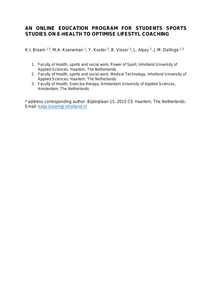In dit abstract wordt de ontwikkeling van een online onderwijsmodule beschreven gericht op eHealth voor leefstijlverbetering
MULTIFILE

Development of an online education program for students sports studies on e-health to optimise lifestyle coaching
DOCUMENT

In de eerste twee delen van het proefschrift vindt u informatie over online opvoedingsondersteuning in het algemeen. Welke studies zijn daarover gepubliceerd? Hoe zien de onderzochte online programma’s voor ouders eruit? Welke kenmerken hebben ze? Hoe effectief zijn ze? In de drie andere delen gaan we dieper in op het eenmalig e-mailconsult. Er zijn veel organisaties in Nederland die ouders de gelegenheid bieden om een advies per e-mail te ontvangen, vaak via een web-formulier of een button op een website. Kunnen beroepskrachten deze vorm van online communicatie gebruiken om ouders te begeleiden naar méér empowerment? In deze brochure leest u een beknopte samenvatting van het proefschrift.
DOCUMENT
